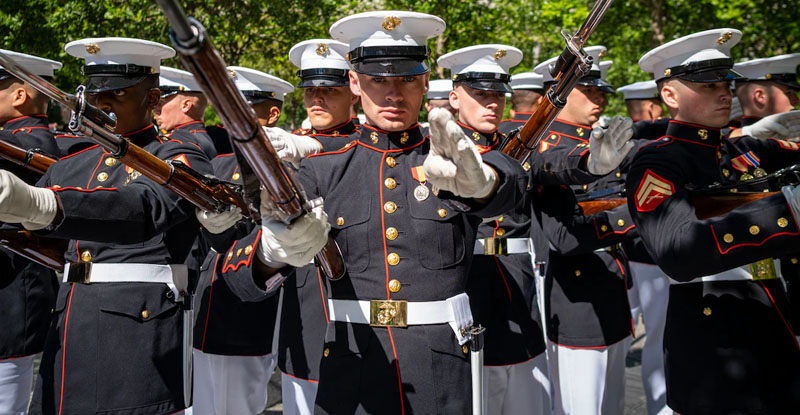By Garret Exner, former USMC Officer
U.S. Marine Corps recruit training, often referred to as “boot camp,” turns civilians into Marines over the course of 13 weeks.
During that time, young men and women relinquish their individuality and identity, taking on the role of recruit to earn the title of Marine eventually. Recruits forget “I” and “my” and replace them with “this recruit.”
Simultaneously, they learn the history of the Marine Corps, a lineage and heritage that becomes theirs once they receive the coveted Eagle, Globe, and Anchor.
This transformation builds unity in the Corps and commitment to its principles, both of which are critical to a military ’s performance.
It is these values that are being undermined by leftist initiatives implemented throughout the military over the past several years.
Rather than building unity and commitment within the ranks, these policies instill division, disunion, or discord, are deleterious, and akin to a cancer in a military.
Unity of command, one of the seven principles of warfare, is taught at every professional military education course in the Defense Department. Unity is more than a vertical principle for the chain of command; it also runs horizontally among members and units.
Any good military commander will argue that soldiers, sailors, airmen, and Marines must be united to a set of core values and to each other.
Similarly, the Army teaches “selfless service” as one of its core values at the United States Military Academy. The phrase implies that the individual does not matter, but instead, service to the nation and its army is paramount.
Critical race theory, or CRT, on the other hand, and most of the recently rebranded diversity, equity, and inclusion, or DEI, initiatives are dividing forces.
These efforts promote and highlight differences in service members and seek to segment members of the military into categories of oppressed and oppressor. In so doing, they undermine the entire purpose of recruit training.
Equity initiatives and CRT seminars are incompatible with a military seeking to strip individuality from its newest members and instill the concept of selfless service.
 Famously, after a lifetime of service to his nation, including time as a U.S. senator and astronaut, John Glenn’s tombstone in Arlington National Cemetery lists U.S. Marine first. The conflicts in which he served (WWII and Korea) follow, then at the bottom are his other professions.
Famously, after a lifetime of service to his nation, including time as a U.S. senator and astronaut, John Glenn’s tombstone in Arlington National Cemetery lists U.S. Marine first. The conflicts in which he served (WWII and Korea) follow, then at the bottom are his other professions.
Interestingly, in a Washington Post 2017 obituary , the order is reversed in a reflection of the difference between the way the civilian world sees itself and the way a Marine sees himself. To Col. Glenn, being a Marine came first; all other qualifiers were footnotes.
His tombstone illustrates the ideal that placing an identity before the title that matters most, Marine, cheapens and diminishes it.
This ideal is vital when considering the effects of leftist diversity initiatives on the military.
Recently, the Biden administration published a Defense Department strategy for DEI called the “ Diversity, Equity, Inclusion, and Accessibility Strategic Plan ” that seeks to emphasize gender and race in military promotions and opportunities for advancement.
This strategy, in simple terms, reduces merit and pushes for quotas based on race, gender, and sexuality.
More worryingly, it states that DEI initiatives be “integrated and embedded into the culture” across the force and that DEI should “inform national security decisions.” It further insinuates that “procurement structures,” which companies our military purchases weapons and equipment from, should account for race and gender as well.
This all places a focus on the differences among service members instead of valuing the unifying aspects of service, merit, and core values.
Sen. Roger Wicker (R-MS), ranking member of the Senate Armed Services Committee, responded to the new DEI strategy by saying,
“This equity approach to promotions and assignments takes a sledgehammer to the foundation of the military. And worse, it creates divisions that put our men and women in uniform at risk.”
As Thucydides wrote in 400 B.C., “He is best who is trained in the severest of schools.” This ethos is still visible at Marine Corps boot camp today, producing Marines through challenge, struggle, and humility.
Yet the DEI strategic plan stands in opposition, promoting a military of individuals by highlighting their differences.
If our military prioritizes individual personal identity in place of core values, such as selfless service and unity, it will fail.
In a famous battlefield interview from Vietnam, a wounded Marine was transported to safety after a fellow Marine braved enemy fire to rescue the wounded comrade. The reporter asks the latter, “What possessed you to go running out into the paddy like that?” The Marine’s response was simple, “He’s a Marine, so I’ll take care of him.”
Notable for the reporter, but apparently not for the two Marines, was the fact that the Marines were of different races — one black and one white. In the moment, when it mattered, race was irrelevant.
What was critical is that they saw each other simply as brothers in arms, forged in the same crucible of training. Their unity, to each other, to the country, and to the Corps was critical to their survival.
The Biden administration is, unfortunately, working to reduce that unity at the cost of military effectiveness.
Garrett Exner is an adjunct fellow at Hudson Institute, the executive director of the Public Interest Fellowship, and on the advisory council of Veterans On Duty. He previously served as a special operations officer in the Marine Corps with deployments to Iraq, North Africa, East Africa, and the South Pacific.








Leave a Comment